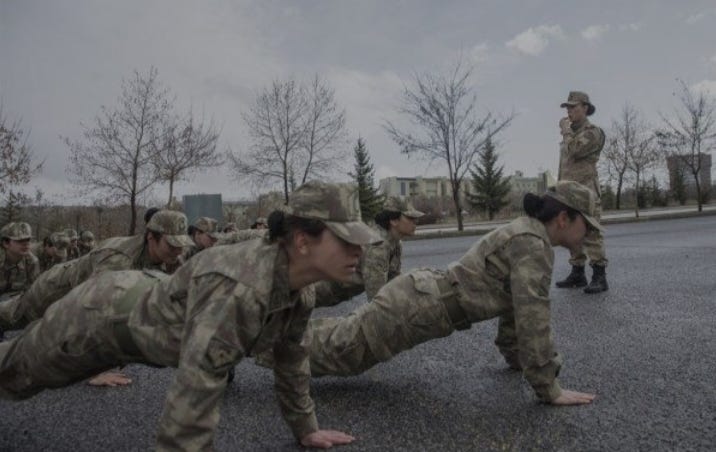I somehow found this internal military report on their secrets to extreme discipline, and what I found here is actually life-changing. Think about it: procrastination, laziness, and not feeling like it. None of that is tolerated in the military. Somehow they're able to take average people, thousands of them every year, and teach them what this paper calls behavioral reliability, otherwise known as consistency.
Self-discipline is the power and self-control to do the things you know you need to do day in and day out. This report has transformed my understanding of how you acquire discipline and even what discipline and self-discipline actually are. Written in 1993 by Major Kevin S. Donahue, "The Anatomy of Discipline" breaks down how and why the US Army creates disciplined soldiers.
What Discipline Actually Is
The main idea of the document is that discipline isn't just one thing. Instead, it should be considered two separate categories. These categories work together to create a disciplined soldier or, in our cases, just a disciplined self.
Let's take a look at the dictionary definition of discipline so we're all on the same page. The Cambridge definition of self-discipline is probably most similar to what we think about when we think, "I wish I had more discipline." Self-discipline is the ability to make yourself do things you know you should do even when you do not want to.
Discipline is a skill that anyone can acquire. It's a process of training yourself to obey your own rules. I quite literally cannot think of a skill more valuable than this.
According to the military, discipline should be split into two separate things:
Discipline A
Discipline B.
Discipline A refers to the observable, measurable behaviors of discipline.
Discipline B refers to internal disciplined attitude. Both A and B together are what create a truly disciplined soldier, and they're both acquired in different ways. In the military, this process begins with Discipline A and what the military calls bootcamp, otherwise known as basic training.
How the Military Creates Discipline
Every year, the US military needs to take thousands of wide-eyed, uninitiated, young men and women and turn them into a well-oiled, disciplined machine. The moment the recruits step foot off the bus, they'll leave their old lives behind and be plunged into 10 weeks of what the document calls a booster shot of discipline. Here's what that looks like:
In basic training, each day begins with yelling and whistle-blowing around 4:00 or 5:00 AM. From there, recruits must spring into action as they only have a few minutes to prepare themselves for the grueling day ahead. In the world of Discipline B, structure and routine are paramount. Nearly every moment is scheduled, accounted for, and regulated. Nearly every behavior is subject to a rigid code of conduct. Every action must be executed exactly according to instruction.
Rigid adherence to protocol is the only option available to a recruit unless they want to endure one of several forms of punishment. Regardless of who they were before training, recruits will have their desired behavior drilled into them until it becomes habit.
Recruits must forget about what they feel, what they think they want, or even what they think they need. These feelings must be subdued in service of obedience, in service of following orders at all costs and under extreme pressure.
Creating Behavioral Reliability
The protocol we've just described is how you create an army of disciplined soldiers. To sum it up, it's done by forcing the trainees to behave in a rigid, disciplined way under threat of punishment. The habit of following orders, no matter what, is drilled in so many times that it becomes habit. This process of creating Discipline A reveals some core truths about how we can create discipline ourselves.
1. Discipline starts with standards.
In basic training, nearly every behavior is subject to a standard, a rule. Similarly, self-discipline starts with creating standards, rules, and plans for your own behaviors and then following through with the rules you create for yourself.
2. Uphold said standards.
Leave no room for compromise. The military and its drill sergeants give zero care that you did not get enough sleep. They don't care how you feel today. They don't even care if you're sick. If something is in order, it's in order. End of story. Creating behavioral reliability is about following your own rules and taking your own orders very seriously.
3. Set yourself up for success by only creating orders you can and will follow.
The tasks asked of a military recruit on day one are a lot different than the tasks asked of them on the first day they step onto the battlefield. You can't expect them to perform incredible feats of discipline until they've been trained to do so. Be cautious with which things you choose to be standards.
4. Discipline is acquired through training until the point of habit.
The military example shows that discipline is something you do repeatedly until it becomes a habit. This is the beginning of the acquisition of Discipline B.
According to Aristotle, virtues are initially acquired through their purposeful activation, leading to the habitation of virtuous deeds. Eventually, the learner internalizes the habitual behavior, leading to the next step of virtuous character. Once a virtue becomes part of your character, it becomes part of your identity. The choice to behave in a disciplined way becomes the more natural choice.
How to Acquire Discipline for Yourself
1. Start with standards.
Create rules and standards for yourself.
2. Never break these promises to yourself.
Do not compromise on these standards.
3. Keep these promises at all costs.
Start small. The goal is a 100% compliance rate.
4. Build up to a disciplined lifestyle.
Once you've established a track record of success with small tasks, start adding in more important tasks.
5. Expect to be on guard with all of these disciplines for at least the first year.
If you drop your guard, you may drop your disciplines.
Discipline is about training yourself to obey your own rules and creating a lifestyle where you adhere to the standards you create for yourself. If you don't have this skill, then what do you have? This skill is the basis for any sort of self-mastery.
"Freedom is obedience to self-formulated rules."
- Aristotle
Read "The Anatomy of Discipline" here:
https://kdocherty.com/anatomy-of-discipline
Thanks for reading Mindful Momentum Subscribe for free to receive new posts and support my work.









Excellent!
How to Acquire Discipline for Yourself
First four points are truth.
"5. Expect to be on guard with all of these disciplines for at least the first year. "
Do not set up Yourself for failure by saying ' first year ' ...
Forever Richa.. forever
Good piece